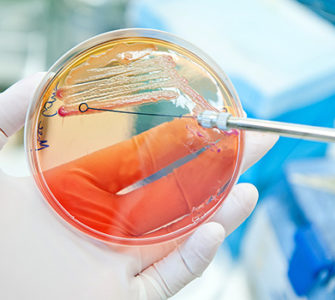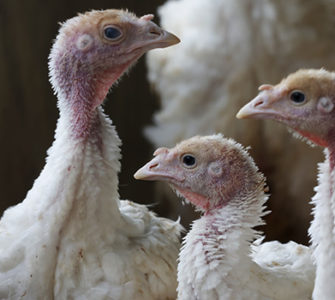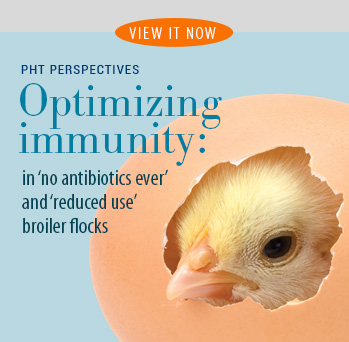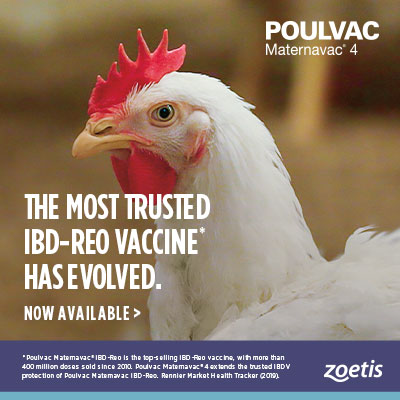Vaccination with Poulvac® E. coli yields economic benefits in broilers
Vaccinating broilers against Escherichia coli yielded a favorable return on investment in a recent trial, with vaccinated birds demonstrating a lower overall mortality rate and improved performance across several economically important indicators.1
In the controlled field trial, conducted in nearly 2 million broiler chickens, vaccinated birds had fewer mortalities overall and better feed conversion, weight gain and final bodyweight than unvaccinated birds in the same production system. Vaccination was also associated with a lower incidence of airsacculitis and fewer condemnations at processing.
According to Nicolette Love, DVM, a Zoetis veterinarian who was involved in the study, E. coli is an economically significant problem on commercial poultry farms that has traditionally been controlled with antimicrobials and management interventions. But as the broiler industry moves to limit antibiotic use, producers have had to explore other E. coli management strategies.
“Using a live E. coli vaccine is one strategy that’s helping producers manage the pathogen on their farms while meeting the growing demand for poultry raised with minimal or no antibiotics,” she said.
“Historically, live vaccination was only used on ‘problem farms’ in broiler production because the cost-benefit ratio was generally not considered favorable in short-lived birds. However, the results of our study demonstrate an economic benefit of vaccination even on farms with normal levels of E. coli challenge.”
Trial design
In a trial conducted in 1.9 million birds on four farms on two production sites in South Africa, investigators vaccinated approximately half the birds with Poulvac® E. coli, with the unvaccinated birds serving as controls.
They evaluated economically important performance indicators, including mortality, feed conversion ratio (FCR), average daily weight gain (ADG), final bodyweight and condemnations at processing. In addition, they recorded lesion scores to assess airsacculitis and collected pericardial fluid samples to perform bacterial cultures and test for multidrug-resistant E. coli.
“It was important for us to look at all of these parameters collectively to get an accurate handle on performance improvement, because it’s possible for one or two to change while the others don’t,” Love explained.
“Using this methodology, we could see a clear financial improvement for the farms.”
Vaccination yields economic benefits
Results from vaccinated birds demonstrated reductions in mortalities as well as improvements in FCR, ADG and final slaughter weights (Tables 1 and 2).
*Vaccinated birds demonstrated improvements in FCR, final bodyweight and ADG. Mortalities were higher in vaccinated birds at Site 1 but were financially outweighed by improvements in feed conversion, bird weight and weight gain.
*Vaccinated birds had fewer mortalities and improved FCR, final bodyweight and ADG compared to unvaccinated birds.
Investigators also noted that vaccinated birds showed reduced incidence of airsacculitis and condemnations at processing compared to the unvaccinated controls (Figures 1 and 2).
“Individually, none of the parameters evaluated was statistically significant, but collectively there was a definite financial benefit,” she said.
Reduced antibiotic use
According to Love, this trial was run on farms that had no particular problems with E. coli, but the benefits of vaccination have been shown to be even more pronounced on farms with more severe E. coli challenges.2
“Once we started to apply the vaccine on these ‘problem farms,’ we saw that there was a dramatic drop in the amount of antimicrobials being used. That has a huge financial benefit for producers,” she said.
“With the move toward reducing or eliminating antibiotics, vaccination is likely to become an important tool for managing E. coli holistically in broilers.”
1 Love N. Demonstration of the economic benefits of using Poulvac E. coli in a commercial broiler operation. Poster presented at: World Vet Poult Assoc Congress. Bangkok, Thailand. 2019 Sept 16-19.
2 Evaluation of broiler performance with Poulvac® E. coli in South Africa. Data on file
All trademarks are the property of Zoetis Services LLC or a related company or a licensor unless otherwise noted.
DISCOVERIES, Issue 7
Discoveries is a series of research news reports written by the editors of Poultry Health Today® on behalf of the Global Poultry Business of Zoetis.
MM-09126
June 2020
Posted on July 7, 2020





















